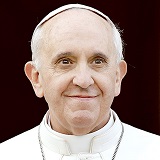This is a guest post contributed by prominent Catholic blogger Michael Sean Winters, of NCR online, who has graciously agreed to kick off a week-long series of posts on theology/ethics and blogging to celebrate of our first anniversary. Check back each day this week for more posts.
A couple of months ago, a friend called me about a blog item I had posted that day which he liked very much. My friend is also a writer, but he writes speeches and, because his clients tend to be important personages, every word must be chosen with exceptional care, with attention to political ramifications as well as syntax, and a concern to avoid rhetorical sharp elbows that might have nasty political consequences. It is, as you can imagine, a laborious process. Consequently, my friend always marvels at the different circumstances faced by those of us who write for blogs and we often talk about those differences. On this day, he asked me, “How long did it take you to write that post?” I replied, “Well, I thought it out in my head while walking to the store this morning, but once I sat down at the computer, it took about an hour.” He was quiet for a moment and then said, “An hour and fifty years.”
Here we discern the great value of a blog like CatholicMoralTheology.com. Anyone can write a concise blog post, but the result is only valuable if the writer knows the range of issues to which such conciseness must be applied. Only writers with some degree of intellectual depth can be succinct, not laconic. And, in today’s twenty-four hour news cycle, with an endless need for editorial content, the blogosphere is often superficial at best, misinformed at worst, and so blogs like CMT fill a vital need if the conversation in the ambient culture is to be grounded in anything resembling sound reasoning rather than soundbites.
This is especially important given trends in publishing. Very few newspapers or magazines still maintain a full-time religion reporter. And, for those that do, the position is not always considered a plum assignment. It is unthinkable that a major newspaper would assign a reporter with no experience of business to cover Wall Street, but many religion reporters come to their task with precisely no basic knowledge of religion or theology. For them, CMT has become an invaluable resource of learned commentary on issues that are both contemporary and complicated.
The intellectual life is complicated. That is why the Catholic Church’s commitment to its own intellectual life provides her with a moral stature that is somewhat unique. It is in the mind of those who are complicated that the simplistic, but often persuasive, rants of the propagandists hit a bump. There is nothing like the tonic of a tradition to assuage the tempests of the intellectual moment, to lower the temperature of a debate and douse the flames of passion with the sweet waters of reason, to invite the superficial to look more deeply at an issue, and to resist the efforts of some to manipulate debate to achieve objectives that may or may not have anything to do with the truth of the matter. Learning and the learned are essential to the conduct of informed discussion and debate without which any culture will soon find its own most treasured qualities endangered and enfeebled.
Of course, if CMT helps bring learning to an often shallow public discussion, it also brings some life and energy to the academy. Academic culture can often invite – even require – a ponderousness that effectively removes itself from public discussion. Some academics seem determined to write in a way that is opaque to others, obscured by the neo-logisms and jargon of an academic priesthood, and focused on minute issues of no general significance to non-academics. Is it really more important to publish a peer-reviewed essay in the Northeast Connecticut Quarterly Theological Review (that will be read by whom?) than to publish a blog post at CMT that might shape public opinion inMassachusettsas that Commonwealth debates a referendum on euthanasia? Here, I would suggest, CMT can discern a part of its ecclesial mission, bringing the best of Catholic moral theology into the public square in a way that it can make a difference in combating evil and fostering the good. I understand there must be a role for peer-reviewed essays, and that colleges and universities have an interest in evaluating such publications in making determinations about tenure, but the academy must searchingly ask itself if it is to be an institution unto itself, filled with a cacophony of internal debates, or if it is to be a leaven to our culture – and to our Church!
It is somewhat amazing to me that discussions of public policy in recent months have led our culture to confront the Catholic moral tradition. Who would have thought that a Catholic theologian would be on Jon Stewart explaining material cooperation with evil? And, the Church faces this enormous challenge, posed now by two pontiffs, to engage in a New Evangelization, for which CMT is ideally suited: The blogosphere is, a sense, the modern Areopagus, and if the Church is not present there, it will miss a key means for reaching so many of our young people for whom the Internet has replaced the Library as the source of learning. CMT, then, not only helps educate those who need it, it helps bring the Church’s rich tradition of moral reasoning to the next generation of Catholics. That alone makes its contribution an invaluable one.
Ours is a fast and furious culture. Our Catholic theological traditions are not fast and not furious. But, by discerning the times, with Christ as the measure, CMT helps the culture slow down and calm down and helps the Church engage the culture in an idiom that can be understood. The writers do not only bring their learning to that culture, they are bringing Christ, Him for whom all Creation thirsts, even when they deny the need or reject the remedy. Yours is not simply an ecclesial mission, it is an evangelical mission, and you have carried it out with panache and profundity. Congratulations on your first anniversary. Ad Multos Annos.




Trackbacks/Pingbacks